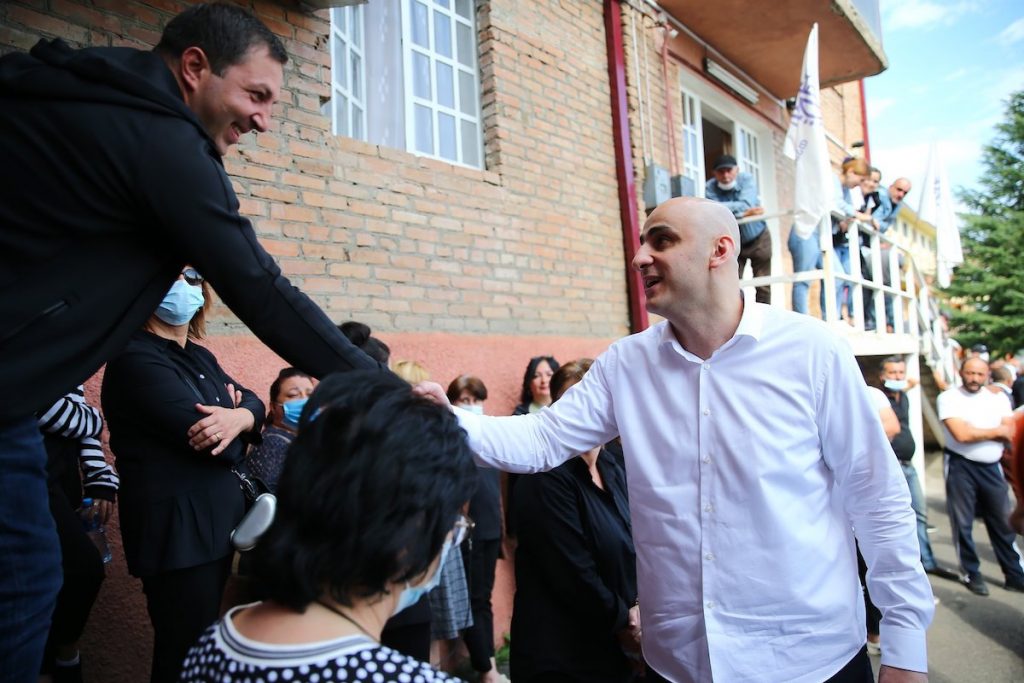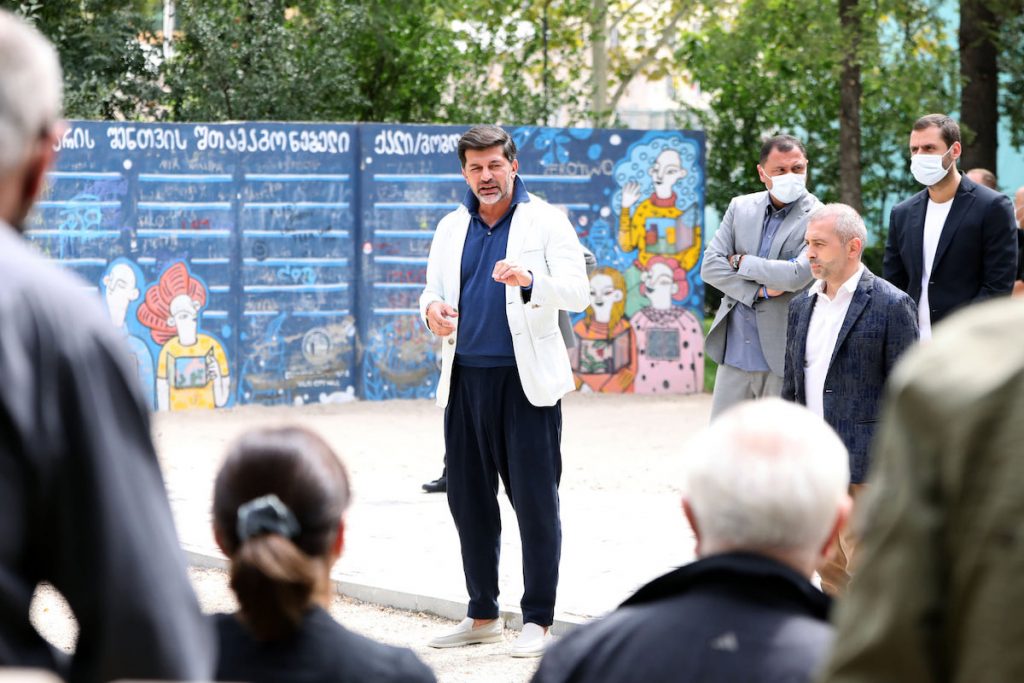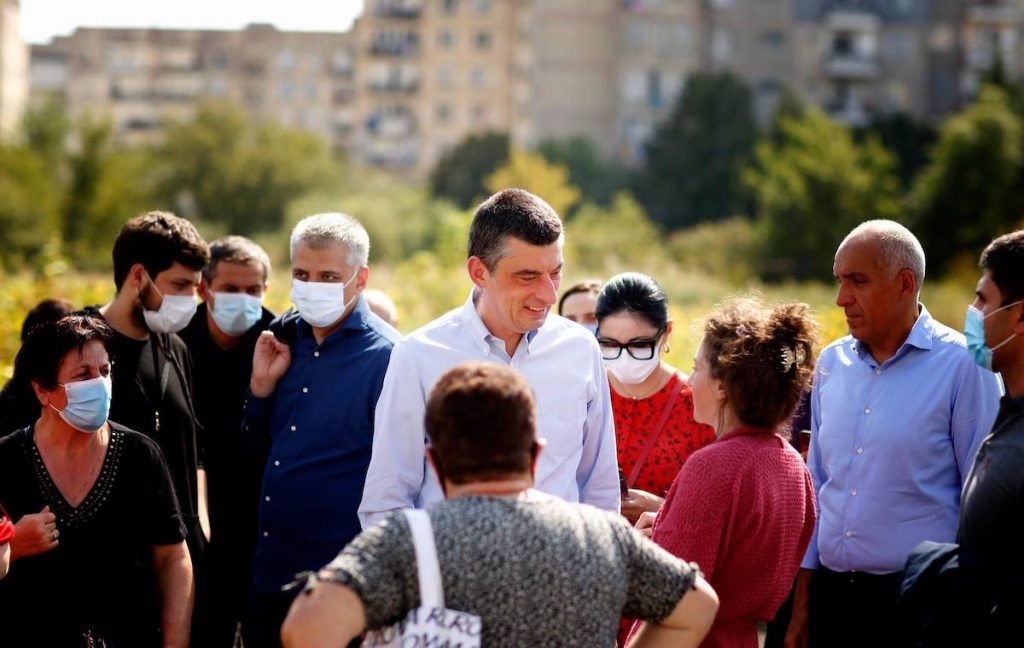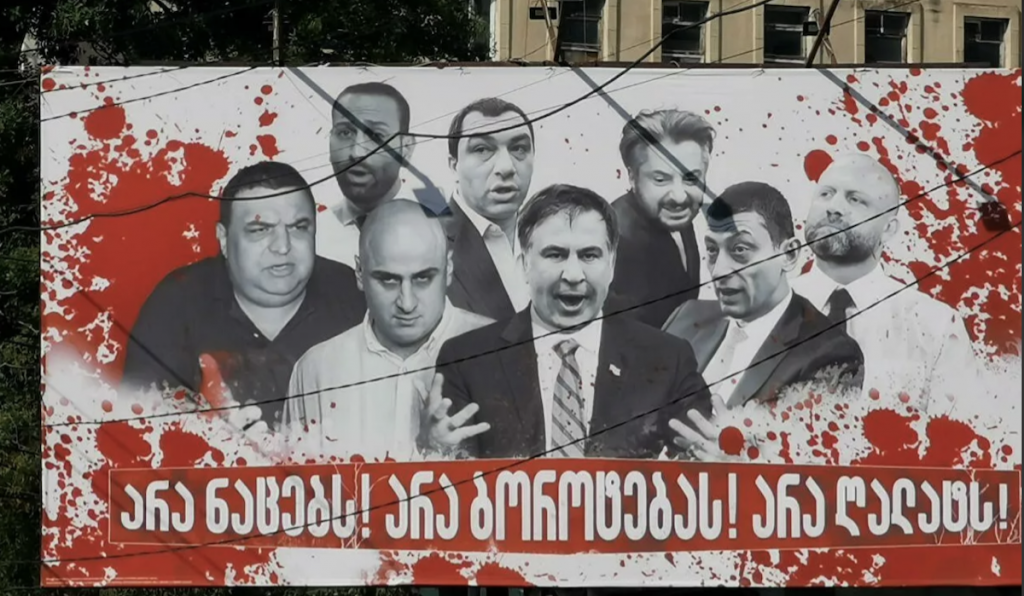Local self-government elections in Georgia: referendum, cocaine and bloody billboards
On October 2, local self-government elections will be held in Georgia.
In theory, these elections will only change the local government and will not lead to changes at the central level, but many describe them as “a referendum” and “decisive”.
_______________________
Why the October 2 elections are important
The last elections in Georgia were held a year ago, in October 2020, when a new parliament was elected in the country. The opposition did not recognize the election results, and a long political crisis began in the country. The opposition refused to enter parliament, held street rallies and called for early elections because they believed the elections were rigged and the results were unfair.
Western diplomats and European officials took part in resolving the crisis, primarily the President of the European Council Charles Michel, who personally visited Georgia three times.
With the mediation of Charles Michel, a document was created that was supposed to lead the country out of the political crisis.
- Georgian gov’t, opposition standoff at an end? What’s in the newly signed agreement
- Why the political crisis in Georgia can’t be solved
- Georgia’s ruling party opts out of EU-brokered agreement with opposition
One of the points of the document was related to the self-government elections – if the ruling Georgian Dream party receives less than 43% of the proportional votes in the local self-government elections in the fall of 2021, early parliamentary elections will have to be scheduled.
The agreement was signed by part of the opposition and the ruling Georgian Dream party. However, a few weeks after the signing, the ruling party suddenly announced that it was withdrawing from the Charles Michel agreement. According to the party leaders, this means that even if the party does not gain 43% of the votes in local elections, early parliamentary elections will not be called.
However, the 43% threshold remains an important factor in this election.
This is a kind of test of the legitimacy of the Georgian Dream authorities. The logic of the opponents of the government is as follows: If the ruling power does not have the support of even 43%, then it would mean that its constitutional majority in parliament is illegitimate.
- Boycott turning into a split? What’s going on in the Georgian opposition
- Georgian Dream vs. the United Opposition – Georgian voters talk about their choices in the elections
Therefore, if the support of the authorities is less than 43%, public unrest demanding early elections will be inevitable, experts say. Many observers also believe that this demand of the opposition will be supported by Western partners since this point was provided for by the Charles Michel agreement.
The authorities, for their part, constantly repeat that in the elections to self-government bodies they will receive much more than 43%, and even if this does not happen, there will be no early parliamentary elections.
What is the main intrigue
The main intrigue is how many votes Georgian Dream will take – will it be 43% which has become a test of legitimacy? According to sociological research, it seems unlikely.
Also, the main intrigue is based in Tbilisi. There are three top-rated politicians running for mayor – the current mayor, former footballer Kakha Kaladze; Opposition leader Nika Melia is chairman of the National Movement, the country’s most popular opposition party, and Giorgi Gakharia, a former key figure in the Georgian Dream and a recent ally of Ivanishvili, who voluntarily resigned in February and later founded the opposition For Georgia party.
◤ Georgia has five self-governing cities (Tbilisi, Kutaisi, Batumi, Poti and Rustavi) and 59 municipalities.
All of these units will elect their mayor and city council. There are 84 constituencies throughout Georgia. In these constituencies, 2,770 people are registered as majoritarian candidates.
It turns out that on average there are 33 candidates in one constituency. The CEC registered a total of 31 parties for the October 2 elections.
Independent candidates can also participate in elections.
16 candidates will run for the post of mayor of Tbilisi. ◢
Nika Melia is the joint candidate of four opposition parties (National Movement, Droa, European Georgia, and Girchi – More Freedom). If Melia wins, the chairman of the city council, Sakrebulo, will be the leader of Droa, Elena Khoshtaria, a young woman politician who left the ranks of European Georgia a few months ago and founded her own party.

According to a poll by Edison Research, the first three places in the ranking of politicians are occupied by politicians fighting for the mayor of Tbilisi – Giorgi Gakharia and Kakha Kaladze, 55% of the population assess him “positively”, and Nika Melia – 46%.

There are 3 million 500 thousand registered voters in Georgia, of which the number of voters in the capital reaches one million.
The Mayor of Tbilisi is elected by direct vote by the population of the capital every four years during elections to the self-government bodies. To win the first round of the mayoral elections, more than 50% of the votes must be collected. If none of the candidates gains more than 50%, then the winner will be determined in the second round. The second round will take place two weeks after the first one.
Who is involved? Is the opposition united?
The main news from the opposition is former Prime Minister Giorgi Gakharia and his newly formed For Georgia party.

According to experts, Gakharia will take most of the votes from the Georgian Dream, since the majority of his voters are former supporters of the ruling party, who for various reasons have lost confidence in Ivanishvili’s team.
- Op-ed: 5 reasons why there is no self-government in Georgia, or why hold the elections
- Poti – the ‘poor rich’ city of Georgia
- Anaklia: Georgia’s forgotten Black Sea resort
Gakharia is an unacceptable figure for a significant part of the traditionally oppositional electorate, as he used to be the Minister of Internal Affairs when special forces dispersed a peaceful rally in front of parliament on June 20, 2019, to protest the speech of Russian MP Sergei Gavrilov in the Georgian parliament. As a result, two people lost their eyes during the dispersal of the rally, and dozens were injured. For this, young activists even nicknamed Gakhariya “Tvalthariya” (“gouging eyes”).
In addition, there are those who perceive Gakharia as another project of Ivanishvili and do not believe that he represents a “real” opposition.
The United National Movement, founded by former President Mikheil Saakashvili, remains the most significant opposition force in Georgia. It is the former ruling party that ruled the country for nine years and has been in opposition for nine years.
The party is currently led by Nika Melia, a popular opposition politician in the country. In February, the authorities violently arrested Melia, sparking serious international backlash. Then-Prime Minister Gakharia, who resigned over the Melia case and strongly opposed the arrest of the opposition leader.
A few months later, Melia was released under intense international pressure.
According to Edison Research, these three parties have the highest ratings:
- Georgian Dream – 33%;
- United National Movement – 25%;
- For Georgia – Giorgi Gakharia – 10%;
The elections are also run by relatively small opposition parties, whose ratings in public opinion polls range from 1-6%.
- Labor Party – 6%;
- Girchi – More freedom (Zurab Japaridze) – 4%;
- Lelo – 3%;
- “For the people – Anna Dolidze” – 3%;
- Alliance of Patriots – 3%;
- Third Power – Strategy Builder – 2%;
- European Georgia – Freedom Movement – 2%;
- Girchi (Yago Khvichiya) – 2%;
- ERI – Levan Vasadze – 2%;
- Droa – Elena Khoshtaria – 1%;
- “Citizens” – Aleko Elisashvili – 1%;
- Others – 2%;
- In other words, those voters who do not support either the Georgian Dream or the National Movement – the two main opposite poles of Georgian politics – will find a variety on the electoral menu.
Two of these parties — the Alliance of Patriots and Eri — Levan Vasadze — are sharply anti-Western and pro-Russian forces. They criticize the West, describe themselves as defenders of traditional values and the church, and are especially intolerant of LGBTQ + people. It was the supporters of businessman Levan Vasadze who initiated the rally on July 5 against the holding of the Pride, which resulted in the death of one person – the operator of TV “Pirveli” Lekso Lashkarava.
The rest of the parties running in the elections with a rating of at least 1% are pro-Western.
In these elections, the opposition runs in a kind of hybrid regime – in some constituencies, several opposition parties support one candidate for mayor, while in others, each has its own candidate. In many constituencies, four parties managed to reach an agreement on a common candidate – National Movement, European Georgia, Girchi – Zurab Japaridze and Elena Khoshtaria’s Droa.
The Gakharia party does not cooperate with other opposition parties on candidates and has its own candidate in all constituencies.
Pre-election strategies
As in all previous elections held under the Georgian Dream government, the main pre-election tactic of the ruling party is to “blacken” opposition parties, representatives of the previous government, and members of Saakashvili’s team and create an enemy image of them.
Speakers of the ruling party in their speeches on state channels mostly talk about the past, calling Saakashvili’s rule a “bloody regime”.
“The main thing is not to allow the revenge of the National Movement”, Irakli Kobakhidze, the chairman of the Georgian Dream and the main face of the pre-election campaign of the government, addressed the voters.
This time, a campaign against Gakharia was added to the PR strategy against the National Movement. Leaders of the ruling party openly accuse him of drug use – Kobakhidze called Gakharia a “cocaine addict”, “traitor” and “liar.”
State TV channels devote entire stories and programs to the topic of Gakharia’s drug addiction.
Also, as part of the election campaign, so-called “bloody billboards” were hung in large cities across the country. They are similar to those used by the ruling party in the parliamentary elections. However, this time Gakharia was added to the representatives of the former government and journalists on billboards.

The administrative resource is one of the most powerful tools in the hands of the government in all elections, and, as experts say, the 2021 elections will be no exception.
The government also has a powerful resource in the form of three central TV channels – Imedi TV, Rustavi 2, and the Public Broadcaster, which are completely controlled by the ruling party and carry out its information policy.
The main object of criticism of the opposition is the government’s foreign policy. Most of the opposition accuses the government of deviating from the Western course and rapprochement with Russia. Arguments include the rejection of the joke of Charles Michel’s agreement, suspension of the construction of strategic facilities (the port of Anaklia, Namakhvanskaya HPP), loyalty to ultra-right groups, etc.
Three popular TV channels – Mtavari Archi and Formula, which are owned and sponsored by former members of Saakashvili’s government, and TV Pirveli, owned by businessman Vato Tsereteli, are pursuing opposition policies. Criminal cases have been initiated against the owners of all three channels. All of them sharply criticize the authorities.
Where are Saakashvili and Ivanishvili?
Bidzina Ivanishvili, the founder of Georgian Dream and the country’s shadow ruler, did not appear in public throughout the entire election campaign.
As for ex-President Mikheil Saakashvili, who remains the main leader for the National Movement supporters, he is currently in Ukraine and faces arrest if he arrives in Georgia.
By tradition, before each election, Saakashvili announces that he will return to Georgia. And this time he made several statements about his arrival, although so far no concrete action has been taken.
According to experts, Saakashvili’s arrival would significantly aggravate the pre-election situation.
What results to expect in this election
It is difficult to predict the exact numbers, but experts do not exclude that if the ruling party gains less than 43%, events may again move to the streets, as the opposition will demand early parliamentary elections.
Also, according to many experts, a second round is expected in Tbilisi between the pro-government candidate and one of the opposition candidates – Melia and Gakharia.


















